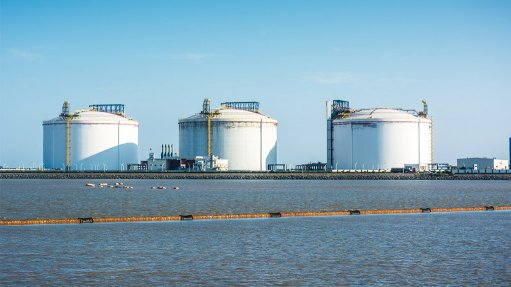Leaders in water and development gather in Stockholm to discuss world’s water crises
This article has been supplied as a media statement and is not written by Creamer Media. It may be available only for a limited time on this website.
Company Announcement - Stockholm (19 August 2015) – World leaders, water experts and development professionals will meet in Stockholm 23-28 August to seek solutions to the world’s several escalating water crises. This year, World Water Week is held under the theme Water for Development. The role of water for development cannot be overestimated. Water is the foundation for all aspects of human and societal progress. While we need it to survive – literally, to quench our thirst, to prepare our food, and maintain our hygiene, it is also central to economic and social development, sustainable growth, and a prerequisite for healthy ecosystems.
While we need to ensure access to safe water for all those who do not have it today, we must also manage the global rise in demand for water from growing economies by increasing water productivity, and find incentives for using it more effectively. Water security is both a condition for, and a result of, sustainable development.
At World Water Week we will address the complex challenges related to water and development and ensure that water receives the priority it deserves in global decision-making. Over 3,000 participants from some 120 countries, representing governments, the private sector, multilateral organizations, civil society and academia will be in Stockholm 23-28 August to shape joint solutions to global water challenges. Speakers at the Opening on 23 August will include the Prime Minister of Sweden, Stefan Löfven; the Prime Minister of Jordan; Abdullah Ensour; the President of the Marshall Islands, Christopher Loeak and the Director-General of the International Renewable Energy Agency, Adnan Z. Amin.
Water connects different policy areas, economic sectors and nations. Climate change: Climate change is to a large extent water change. We feel the impact of climate change through water. Increased rainfall variability, less reliable monsoons, prolonged droughts and reduced water storage in snow and ice are just some effects. California is currently suffering the worst drought in living memory, straining parts of the state’s economy. Cities are rationing water and food prices are increasing. Water is also critical for the mitigation of climate change, as many efforts to reduce greenhouse gas emissions depend on reliable access to water resources. Expansion of renewable energy will to a large extent also depend on access to water - on all levels.
Food and nutrition: About 800 million people in the world are undernourished, and prevalence is going down. Overweight and obesity rates are heading the other direction and today, around 2 billion are overweight or obese. Meanwhile, about a third of all food produced is either lost or thrown out by the consumer. Since most food production demands huge amounts of water, this means rivers of water are literally lost as a result of food being lost or discarded, or overeating.
Water and conflict: Approximately 276 river basins cross the political boundaries of two or more countries, and serve as a primary source of freshwater for approximately 40 percent of the world's population. Decisions on water allocations can be a source of conflict, but also a catalyst for cooperation and peace building.
Trilateral and multilateral cooperation is, for example, the only solution to current challenges relating to the Grand Ethiopian Renaissance Dam in the Blue Nile region. Cooperation over transboundary waters is therefore not only a necessity, but an opportunity for people, regions and states to strengthen and develop cooperation, and to open up new paths of working together.
Social instability: Regional droughts and water stress in combination with water mismanagement and poor governance risk escalating into social unrest, as seen during the Arab Spring in 2011. The World Economic Forum ranks water crises as the world’s biggest risk and underlying driver of global instability.
Health: An estimated 1.8 billion people live without access to safe water and 2.4 billion people lack access to adequate sanitation. Diseases caused by unsafe water and poor sanitation and hygiene kill more than 5,000 people each day.
Comments
Press Office
Announcements
What's On
Subscribe to improve your user experience...
Option 1 (equivalent of R125 a month):
Receive a weekly copy of Creamer Media's Engineering News & Mining Weekly magazine
(print copy for those in South Africa and e-magazine for those outside of South Africa)
Receive daily email newsletters
Access to full search results
Access archive of magazine back copies
Access to Projects in Progress
Access to ONE Research Report of your choice in PDF format
Option 2 (equivalent of R375 a month):
All benefits from Option 1
PLUS
Access to Creamer Media's Research Channel Africa for ALL Research Reports, in PDF format, on various industrial and mining sectors
including Electricity; Water; Energy Transition; Hydrogen; Roads, Rail and Ports; Coal; Gold; Platinum; Battery Metals; etc.
Already a subscriber?
Forgotten your password?
Receive weekly copy of Creamer Media's Engineering News & Mining Weekly magazine (print copy for those in South Africa and e-magazine for those outside of South Africa)
➕
Recieve daily email newsletters
➕
Access to full search results
➕
Access archive of magazine back copies
➕
Access to Projects in Progress
➕
Access to ONE Research Report of your choice in PDF format
RESEARCH CHANNEL AFRICA
R4500 (equivalent of R375 a month)
SUBSCRIBEAll benefits from Option 1
➕
Access to Creamer Media's Research Channel Africa for ALL Research Reports on various industrial and mining sectors, in PDF format, including on:
Electricity
➕
Water
➕
Energy Transition
➕
Hydrogen
➕
Roads, Rail and Ports
➕
Coal
➕
Gold
➕
Platinum
➕
Battery Metals
➕
etc.
Receive all benefits from Option 1 or Option 2 delivered to numerous people at your company
➕
Multiple User names and Passwords for simultaneous log-ins
➕
Intranet integration access to all in your organisation


















